- Home
- Jodi Picoult
Lone Wolf Page 6
Lone Wolf Read online
Page 6
Looking at the husk of my father in his hospital bed, I wonder if he's already moved on.
LUKE
I hated college. There were too many buildings, too much concrete. It seemed counterintuitive to be studying zoology from textbooks instead of sitting quietly for hours in the woods, experiencing animals firsthand. I had my fair share of women and parties, but you'd be just as likely to find me hiking the Presidential Range, or camping in the White Mountains. It got to the point where I could pick out the distinctive voices of a great gray owl or a bohemian waxwing, a pine grosbeak or black-throated blue warbler. I tracked black bear and white-tailed deer and moose.
When I graduated with a degree in zoology, I got hired as a keeper at the only zoo in New Hampshire, down in the Manchester area. Wigglesworth Animal Park was a privately owned establishment that was half petting zoo with a handful of wild animals thrown into the mix. I worked my way up from the alpacas to the fisher cats to the red fox and finally to the wolves. The pack of five was kept in a small double-fenced enclosure with thick trees and a ridged rise that the wolves would sit on during the daytime hours. Every three days one of the keepers would bring in food--the carcass of a calf purchased from an abattoir. Anyone who entered would carry a ski pole--and it wasn't just the wolf keepers who did this but also those who worked with the cougars or the black bear or any other big animal. I don't know what damage any of us could really have inflicted with a ski pole, but it wasn't necessary, anyway. The wolves were far more scared of us than we were of them. The minute they heard the lock on the double gate being opened, they would rush through the thickest part of the wooded area to the den at the far northeast corner of the enclosure. We'd leave the carcass, and only long after we were out of the enclosure would they venture back to eat.
The day I first went in without a ski pole, I was checking the fence--part of the routine of a keeper. But instead of doing my duty and hightailing it out of the enclosure, I decided to sit and stay. Unarmed and uneasy, my blood racing with adrenaline, I sat down on the ridge where I'd seen the wolves settle daily, and I waited.
I was thinking that, like the deer and the moose I'd encountered as a child, these animals might eventually feel comfortable enough with me to go about their business as usual.
I was thinking wrong.
After five days of my sitting in the wolf enclosure, with the other keepers convinced I had a screw loose, not a single animal had approached me.
I have been asked so many times what made me choose this path in life. I think part of it was that animals have always been straight with me, but humans haven't. But the other part is that I don't take no for an answer very easily. So instead of giving up and going back to animal care with a ski pole, I thought about what I might be doing wrong.
And then I realized that I might not have a ski pole with me but I still had the advantage. When I'd been a boy, I'd sneak out at dusk and dawn to see the animals--but they made themselves scarce midday. If I wanted to put the wolves at ease, I had to approach them when they had the upper hand. So I went to my boss and asked for permission to stay in the wolf enclosure overnight.
Mind you, once the park closed its gates, at 6:00 P.M., the keepers all went home. There was a skeleton staff in place overnight, but only for emergencies. My boss told me I could do what I wanted, but I could see from the look on his face he thought he'd be hiring a new keeper after this one died of his injuries.
It's hard for me to describe what it was like, locking myself inside the enclosure that first time. At the beginning, all that existed was pure panic. The dark had a heartbeat, and I couldn't see well enough to know where the roots of the trees were sticking up. I could hear the movement of the wolves, but I also knew they had the ability to stalk silently if they were so inclined. I tripped my way to my usual spot--the ridge--and sat down. Unfamiliar sounds from all over the wildlife park pinned me in place. This is what you wanted, I told myself.
I tried to close my eyes and sleep, but I couldn't relax. Instead, I began counting stars, and before I knew it, the yolk of the sun was breaking on the horizon.
It was great to work with the wolves during the day, but I was really there to keep the people who came to the park from doing stupid things, like throwing them food or leaning too close to the fence. In the nighttime, though, I was alone with these magnificent animals, these kings and queens of the half-light. At the end of their day they weren't worrying about paying the bills, or what they were going to eat for breakfast, or what to do about the crack in the concrete, man-made pond. All that mattered was that they were together, and that they were safe.
For the next four nights, I locked myself into the wolf pen after the last zookeeper had gone home. And every night, the wolves stayed as far away from me as possible. On the fifth night, just after midnight, I got up and moved from the ridge to the rear of the fenced area. Two of the wolves bounded toward the spot where I'd been sitting. They sniffed the ground and one of them urinated. Then they moved away from the ridge, and spent the rest of their night staring at me with their yellow eyes.
On the sixth night, the wolf we called Arlo approached me. He moved in a slow circle, sniffing, before moving away.
He did the same thing on the seventh and eighth nights, too.
On the ninth night, he sniffed and circled and turned as if he were going to walk away but then whipped around and bit me on the knee.
It wasn't a painful bite. He could have easily gone for my throat if he'd wanted to. It was just a nip, and it scared me more than it hurt me.
The real power of a wolf isn't in its fearsome jaws, which can clench with fifteen hundred pounds of pressure per square inch. The real power of a wolf is having that strength, and knowing when not to use it.
I didn't move. I figured if I tried to get up and leave the enclosure, Arlo might take me down and deliver a lot worse than a nip. Paralyzed by fear, I waited for Arlo to trot away. I didn't move until the sunrise.
Much later I would learn that this terror probably is what kept me alive that night. When a new member comes to a pack--a lone wolf, for example, filling a vacancy--he's tested to prove that he's capable of holding the position, and that he will not threaten the others in the family. This test takes the form of a bite. If the new wolf doesn't expose his throat to highlight his vulnerability and ask for trust, the wolves already in the pack will do what they must to teach him a lesson. If I'd flinched when Arlo nipped me, or gotten up and run out of the enclosure, I could have been killed.
The next night, Arlo bit me again. After two weeks, my knees, calves, and ankles were covered with bruises and cuts. Then one night, he brushed up against me. He was slightly damp from a light rain, and I thought at first he was trying to dry himself, but he rubbed his face, the top of his head, and his tail against me. When he pushed against me with all 120 pounds of his body and I fell backward, he nipped at me--another warning to stay in place. He continued to shimmy against me, until I smelled like a wet dog, too.
Which was exactly why he was doing it. A few weeks later he began to bring the other members of the pack to my spot on the ridge. They would hang back, wary, while Arlo bit me on the knee and shin. It was Arlo's way of showing them, I realized, that I could take direction.
That I could be trusted.
GEORGIE
"Drinking?" I say, stunned. "You were drinking?"
The police are gone, chased away by a nurse after Cara dissolves into shoulder-wracking sobs that leave her gasping with pain. I don't know who I'm more angry at: the cops, for trying to accuse her of a DUI; or Cara, for lying to me in the first place.
"It was one drink--"
"Served in what? A bucket?" I ask. "Blood tests are pretty damn accurate, Cara."
"I went to a party with Mariah," she says. "I didn't even want to go, it was some guy from Bethlehem High she met at a track meet. And as soon as it started to get out of control, I called Dad and asked him to come get me. I'm telling you the truth. I swear I am."
/>
"Why didn't you say anything when the ER doctors asked if you had any drugs or alcohol in your system?"
"Because," Cara says, "I knew this was going to happen. I made a mistake, okay? Haven't you ever made a mistake?"
God, yes.
"If you couldn't admit it to the doctors," I say, "you might have at least told me. You made me feel like an idiot in front of those policemen."
Cara's mouth twists. "How do you think I feel? If it wasn't for me--if I hadn't been drinking--Dad wouldn't have gotten hurt. He would never even have been out on the road."
That, finally, cuts through the red rage I've been seeing since hearing that my underage daughter was drinking while on Luke's watch. If I'd found out any other way, I would have called him on it. I would have yelled at him about not being a responsible parent, about changing the custodial agreement.
But I can't very well yell at him right now.
"Cara," I say, sitting on the edge of the bed. "It was a car accident. An accident. You can't blame yourself."
She jerks away from me. "You weren't there!" she snaps.
It's a criticism of me. I just don't know if she is upset with me for talking about the crash or for being with my other family when it happened.
I'd like to believe that if Cara had still been living under my roof, she wouldn't have been drinking. That if she had stayed with me, we wouldn't be in a hospital. Unlike Luke, who was always so wrapped up in his wolves, I would actually know what my own daughter's up to and I would never let her out late on a school night. But it is always easy to rewrite history after the fact. The truth is, even if Cara had not chosen to go live with her dad instead of me, I might have found myself the recipient of that phone call last Thursday from Cara, begging to be rescued.
There have been a handful of times in my life when I have suddenly had the perspective to be able to see myself from a distance, to trace how I got to that point. The first was the morning I read the note from Edward, telling me that he had left home. The second was at my wedding to Joe, when I was--maybe for the first time--unadulteratedly happy. The third was when the twins were born. And the fourth, now, is at the crux of a nightmare--my first family, all drawn together again, and inextricably linked once more because of Luke's dynamic persona. Be careful what you wish for.
"You can tell Dad to ground me," Cara says. "When he wakes up."
I don't have the heart to tell her that is an if, not a when.
Which means she's not the only person in this room who is a liar.
I met Luke when I was assigned to do a story on him for a local news show. I was convinced that I was going to be the next Katie Couric, even if I was currently slogging in the trenches of local New Hampshire television. Never mind that sometimes the anchors were so bad I watched the videotaped newscasts as a drinking game--every time a word was mispronounced I would have a sip of wine, and often downed an entire bottle in a thirty-minute newscast. My job was to spotlight the quirky, crusty, unique residents of the state in the last three minutes of the evening newscast.
I'd met my share of the weird--the farmer's wife who dressed up her barn cats in hand-sewn costumes and photographed them in the same positions as famous paintings; the bagel baker who had accidentally created a cheddar-dill concoction that bore an uncanny resemblance to the governor; the petite blonde elementary school teacher who had won a lumberjack contest in the north country. One day my crew (which meant me and a guy lugging a camera) was dispatched to the only zoo in New Hampshire, a sleepy little Manchester-area establishment with horseback trail rides, a dairy discovery barn, and a thin collection of wildlife.
We had been tipped off to the story by a viewer, who'd brought his toddler down to the zoo and who had been surprised to see a crowd gathered around the small enclosure where the wolves were kept. Apparently one of the zookeepers, Luke Warren, had begun to sleep overnight with the animals, and to spend part of the day inside the enclosure. His superiors--at first sure this was a suicide attempt--now realized the wolves had accepted him into their fold and encouraged Luke to interact with them during the park's open hours. His antics had single-handedly quadrupled the zoo's business.
When Alfred, my cameraman, and I arrived at the enclosure, we had to push our way through the crowd lined up along the fence. Inside were five wolves, and one human. Luke Warren was seated between two animals that were easily each over a hundred pounds. When he saw us, he walked toward the double gates leading out of the enclosure as people whispered and pointed. He greeted those who wanted to ask him questions about the wolves, and then he approached my cameraman. "You must be George," he said.
I stepped forward. "No. That's me. It's Georgie."
Luke laughed. "You're definitely not what I expected."
I could have said the same. I figured that this guy would be a nut job like most of the others I interviewed--peculiar to the point of dysfunctional. But Luke Warren was tall and muscular, with blond hair that reached down to his shoulders and eyes so pale and blue that, for a moment, I had trouble remembering what I was doing there. He wore a ratty old set of coveralls. "Just let me get out of these," he said, unzipping them to reveal the khaki uniform of a zookeeper. "The wolves are used to this scent, but by now, my clothes could probably walk away by themselves."
He disappeared into a keeper's hut and returned a moment later, his hair tied back neatly and his face and hands freshly washed. "So," I said. "You don't mind if we film . . . ?"
"Go right ahead," Luke replied. He led us to a bench that offered the best view of the wolves behind him, because--as he said--they were the real stars.
"I'm rolling," Alfred said.
I folded my hands in my lap. "You've been staying overnight in the enclosure for some time now . . ."
Luke nodded. "Four months."
"Continuously?" I asked.
"Yeah. It's gotten to the point where it's more comfortable for me than any bed."
Already, I was wondering what this guy's angle was. You didn't go sleep with wild animals for four months unless you were trying to get attention drawn to you or you were mentally ill. I thought maybe he wanted his own talk show. In those days, everyone did. "Don't you worry about the wolves attacking you while you sleep?"
He smiled. "I'm not going to lie--the first night I went in, I didn't get any sleep. But on the whole, a wolf is far more afraid of a human than vice versa. At this point, because I allowed them to teach me instead of telling them what to do, they've accepted me as a low-ranking member of their pack."
Definitely mental illness, I thought. "Well, Luke, the obvious question is: why?"
He shrugged. "I think if you want to know what a wolf is really like, you can't just observe. Most biologists would disagree, and say that you can watch the interaction of a wolf pack through your camera lens and draw your conclusions based on what you know of human behavior--but isn't that completely backward? If you want to understand a wolf's world, you have to be willing to live in it. You have to speak his language."
"So you're telling me you speak wolf?"
Luke grinned. "Fluently. I could even teach you a few phrases." He stood up, setting one foot on the bench as he leaned in. "There are three different types of howls a wolf makes," he explained. "There's a locating howl, which gives the whereabouts of any pack that's in the area. Not just my family, but rival packs, too. The defensive howl is a little deeper. It means stay away; it's a way to protect your territory and the pack inside it. The third type of howl is a rallying howl. That's the classic Hollywood howl--mournful, melancholy. It's used when a pack member is lost, and scientists used to think it was a measure of grief, but actually, it's a vocal beacon. A way for a missing family member to try to find his way back home."
"Can you show me?"
"Only if you help," Luke said. He pulled me up until I was standing. "Take deep breaths, filling your lungs. Hold those breaths as long as you can, and then exhale. On the third breath, send the howl." He inhaled three times, cupped his h
and to his mouth, and a long, two-tone note swelled through the enclosure, rising over the tops of the trees. The wolves looked up, curious. "Try it," he said.
"I can't--"
"Of course you can." He put his hands on my shoulders from behind. "Breathe in," he coached. "Breathe out. In . . . out. In . . . ready?" Leaning forward, he whispered into my ear. "Let go."
I closed my eyes, and all the air in my lungs poured forward on a vibration that started in my center and filled my body. Then I did it again. It was primal, guttural. Behind me, I could hear Luke howling a different pattern--longer, lower, more intense. When his voice tangled with mine, the result was a song. This time the wolves in the enclosure tipped their heads back and answered us.
"That's amazing!" I cried, breaking off to listen as their howls rolled in patterns, like waves. "Do they know we're human?"
"Does it matter?" Luke asked. "That was a locating howl. Pretty basic."
"Do another one?"
He took a deep breath, rounding his mouth into an O. The sound that issued was completely different, like a distillation of grief. In that one note I heard the soul of a saxophone, a breaking heart.
"What does that one mean?"
He stared at me, so intense I couldn't look away. "Is it you?" Luke whispered. "Are you the one I'm looking for?"
Cara is trying--unsuccessfully--to eat the Jell-O on her dinner tray. She can chase the little bowl around with her left hand, but every time she tries to get a spoonful, it either tips over or scoots forward. "Here," I say, sitting down on the edge of the bed and feeding her myself.
She opens her mouth like a baby bird, swallows. "Are you still mad at me?"
"Yes," I sigh. "But that doesn't mean I don't love you." I watch as she takes another bite, remembering how hard it was to get Cara to eat solid food. She was more likely to mash it into her hair, finger-paint on her high chair tray, or spit it in my face than eat it. At her well-child weigh-ins, she was always on the verge of undernourished, and I'd go out of my way to explain to the nurse practitioners that I wasn't starving her--she was starving herself.

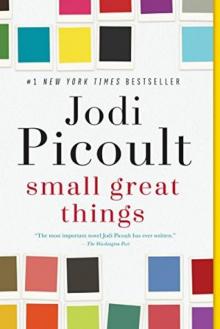 Small Great Things
Small Great Things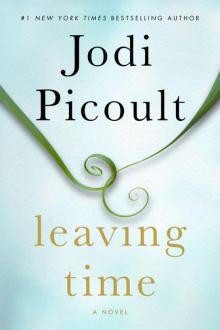 Leaving Time
Leaving Time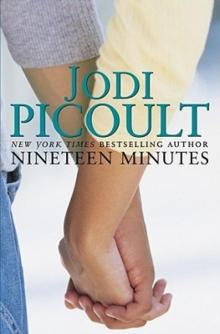 Nineteen Minutes
Nineteen Minutes Larger Than Life
Larger Than Life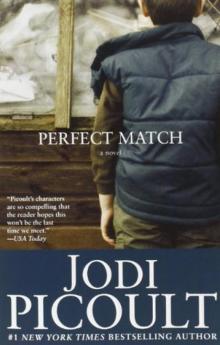 Perfect Match
Perfect Match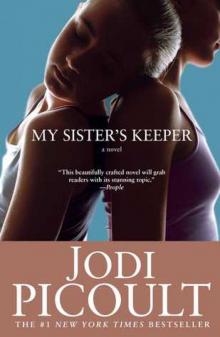 My Sister's Keeper
My Sister's Keeper The Pact
The Pact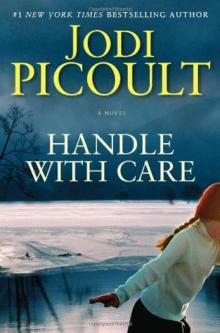 Handle With Care
Handle With Care Songs of the Humpback Whale
Songs of the Humpback Whale Mermaid
Mermaid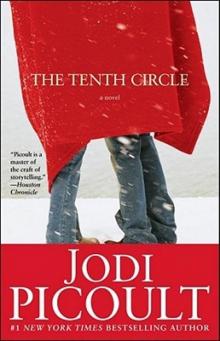 The Tenth Circle
The Tenth Circle The Color War
The Color War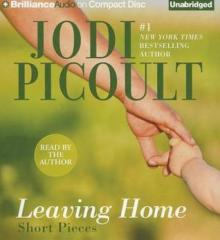 Leaving Home: Short Pieces
Leaving Home: Short Pieces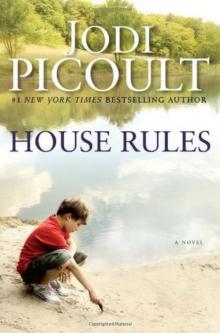 House Rules
House Rules Lone Wolf
Lone Wolf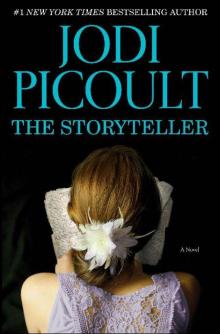 The Storyteller
The Storyteller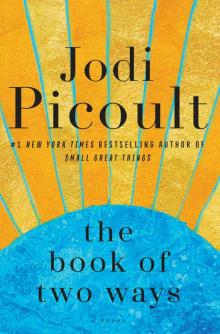 The Book of Two Ways
The Book of Two Ways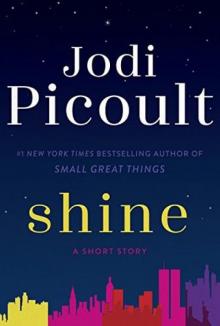 Shine
Shine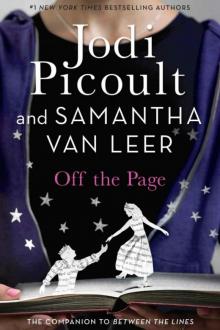 Off the Page
Off the Page Sing You Home
Sing You Home Second Glance: A Novel
Second Glance: A Novel Mercy
Mercy Vanishing Acts
Vanishing Acts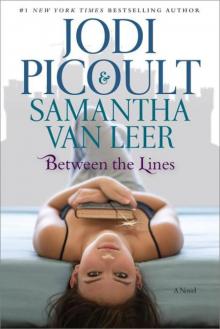 Between the Lines
Between the Lines Plain Truth
Plain Truth Salem Falls
Salem Falls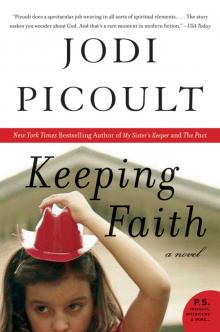 Keeping Faith
Keeping Faith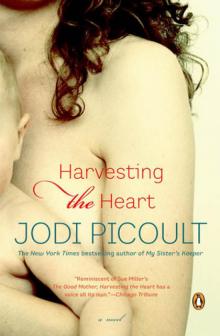 Harvesting the Heart
Harvesting the Heart Change of Heart
Change of Heart Where There's Smoke
Where There's Smoke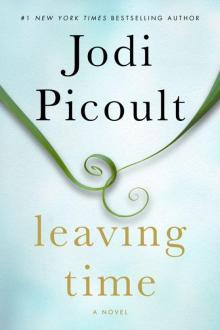 Leaving Time: A Novel
Leaving Time: A Novel Over the Moon
Over the Moon House Rules: A Novel
House Rules: A Novel The Jodi Picoult Collection #2
The Jodi Picoult Collection #2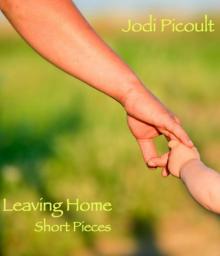 Leaving Home: Short Pieces (Kindle Single)
Leaving Home: Short Pieces (Kindle Single) My Sister's Keeper: A Novel
My Sister's Keeper: A Novel![Mermaid [Kindle in Motion] (Kindle Single) Read online](http://i1.bookreadfree.com/i1/04/03/mermaid_kindle_in_motion_kindle_single_preview.jpg) Mermaid [Kindle in Motion] (Kindle Single)
Mermaid [Kindle in Motion] (Kindle Single) The Jodi Picoult Collection #4
The Jodi Picoult Collection #4 Sing You Home: A Novel
Sing You Home: A Novel The Jodi Picoult Collection
The Jodi Picoult Collection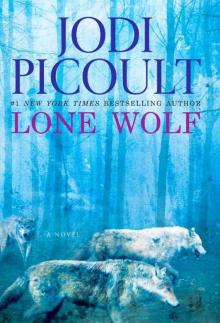 Lone Wolf A Novel
Lone Wolf A Novel Second Glance
Second Glance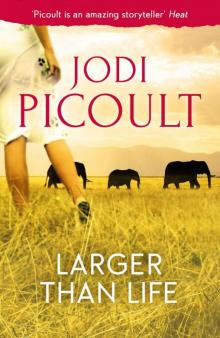 Larger Than Life (Novella)
Larger Than Life (Novella) The Jodi Picoult Collection #3
The Jodi Picoult Collection #3